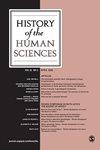Socialist gerontology? Or gerontology during socialism? The Bulgarian case
IF 0.5
2区 历史学
Q2 HISTORY & PHILOSOPHY OF SCIENCE
引用次数: 0
Abstract
This article focuses on the emergence and development of gerontology in communist Bulgaria, looking at the interplay of various circumstances: scientific and political, national and international. We ask if an apparently ideologically neutral field of knowledge such as gerontology may have had some intrinsic qualities imbued by the regimes of knowledge production under a communist regime. More specifically, we ask to what extent and in which ways the production of such specialized, putatively universal knowledge could be ideologically driven and/or politically controlled. To this end, we unpack the ideological, political, institutional, and epistemic circumstances that may have affected the emergence, the institutionalization, and the paradigm of Bulgarian gerontology. We focus in on the social actors, both individuals and organizations, and the roles they played in the process, as well as on international networking and the uses of international contacts and agendas.社会老年学吗?还是社会主义时期的老年学?保加利亚案例
这篇文章的重点是在共产主义保加利亚老年学的出现和发展,看看各种情况的相互作用:科学和政治,国家和国际。我们问,一个表面上意识形态中立的知识领域,如老年学,是否可能具有共产主义政权下知识生产制度所灌输的一些内在品质。更具体地说,我们要问的是,这种专业化的、假定的普遍知识的生产在多大程度上以及以何种方式受到意识形态驱动和/或政治控制。为此,我们打开意识形态,政治,制度和认识的情况下,可能已经影响了保加利亚老年学的出现,制度化和范式。我们关注社会行动者,包括个人和组织,以及他们在这一过程中扮演的角色,以及国际网络和国际联系和议程的使用。
本文章由计算机程序翻译,如有差异,请以英文原文为准。
求助全文
约1分钟内获得全文
求助全文
来源期刊

History of the Human Sciences
综合性期刊-科学史与科学哲学
CiteScore
1.60
自引率
11.10%
发文量
31
审稿时长
>12 weeks
期刊介绍:
History of the Human Sciences aims to expand our understanding of the human world through a broad interdisciplinary approach. The journal will bring you critical articles from sociology, psychology, anthropology and politics, and link their interests with those of philosophy, literary criticism, art history, linguistics, psychoanalysis, aesthetics and law.
 求助内容:
求助内容: 应助结果提醒方式:
应助结果提醒方式:


